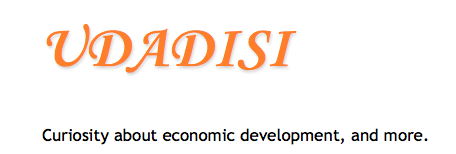 |
| D.H. Arancibia. Wikimedia Commons. This file is licensed under the Creative Commons Attribution-Share Alike 3.0 Unported |
A recent tweet by Deirdre N McCloskey, @DeirdreMcClosk:
Novels draw economists into thinking about meaning, and away from mere rat behavior, as for example A House for Mr. Biswas drew Bob Lucas.
I find Deirdre's tweet very profound.
A House for Mr. Biswas illustrates economic improvement through different generations, where the accumulation of human capital plays an important role. I don't know if that novel was a source of inspiration to Lucas, or a way to illustrate his ideas. See here. Skidelsky wrote:
Lucas cites that "great novel of economic development," V.S. Naipaul's A House for Mr. Biswas, to illustrate his theme. Born in rural Trinidad, the grandson of immigrants who came to Trinidad as indentured servants, Mohun Biswas becomes a journalist in Port-of-Spain. By the time he dies, his oldest son, Anand, is a scholarship student at Oxford. "Between Anand and Mohun Biswas's parents is the entire 25–1 difference between living standards in India and living standards in Western Europe and the United States." By incorporating population as well as technology into his model, Lucas has generalized his theory of economic development. All that is needed for it to happen is that "people must experience changes in the possible lives they imagine for themselves and their children."
I have read about the "meaning of economics" but much less so about the "economics of meaning." My perception is that economists don't usually read (like) novels, of course I might be totally wrong. But we know that Tyler Cowen, Chris Blattman, Bryan Caplan, and Robin Hanson do. Are they outliers?
I like novels because they show human behavior outside formal models (only through the imagination of the author. One might say that that is also a model, but there isn't ceteris paribus - or there is?). The Brothers Karamazov comes particularly to mind. Novels show more clearly the behavioral (economics) aspects of human action.
But Deirdre talks about something deeper: novels as a way to think about meaning.
What would be economics especial perspective on meaning? What is the role of meaning in economics, or in economic analysis? What kind of economic insights would reading novels generate? Some would probably argue that meaning is subjective and as a consequence it is outside the realm of economic analysis.
There are links between reading novels and economic progress
For some a meaning of life could be guided by the belief in "work ethic." James Buchanan wrote on the positive economic consequences of work ethic. Novels present fictional characters that might become a motivation to work hard, to "keep trying," etc., which might be important for entrepreneurship and prosperity.
Meaning implies also the definition of one's identity which according to Seabright is necessary for an individual to fit in the job market.
An interesting article is here.

No comments:
Post a Comment